Bentley’s designers have eclectic taste, as we found out when we paid a visit to its top-secret studio viewing area
Assume, if you can, the mindset of somebody who spends their days creating new Bentleys.
Your mission is to satisfy people who think it’s normal to pay £200,000 plus for a set of wheels but who, rather than merely requiring luxury, want cars that are more durable, more day-to -day practical and more dynamically capable than similarly priced rivals.
Though these are tough targets, the general road test feeling is that current Bentleys achieve them. But how do you keep it going in future? Those of us who will never design a Bentley imagine that the creatives must need – at least part of the time – to live parallel lives to their customers in order to fully understand them: turning left when boarding a Boeing, buying suits in Savile Row and sporting Rolexes and titanium-handled toothbrushes. But is it true?
Above all, what are their cars like? No single possession better illustrates the likes and leanings of a car- conscious person than the make and model they choose for themselves.
To find some answers, we recently jumped at the chance to meet 30 or so members of Bentley ’s design staff at an event they called ‘Design and Drives’. It took place behind the tall and forbidding iron gates of the super-secret design studio viewing compound, which is usually used for assessing prototypes and radical paint jobs in daylight but out of the public eye.
This compound is at the unimproved eastern end of Pyms Lane, the piece of former public road on the outskirts of Crewe colonised a few years ago by Bent ley when it started erecting engineering buildings on the other side of the road. Now it’s the urn of the original HQ building to get the treatment: it is being extensively renovated to house, among other things, a bigger and better design studio, complete with a ‘design garden’ on the roof.
It ’s an indicator of the heavy workload of design departments nowadays that a tightish two-hour slot was allocated for Design and Drives: participants parked their cars in the compound on arrival, then reappeared around midday for a slightly extended lunchtime.
I was ushered through the gates to meet organiser Steve Crowe, the studio engineering design manager who put the event together and had brought his own clean but well-used Porsche 911 (996) to take part.

Crowe seems a natural-born organiser, having founded a body called PLMC (Pyms Lane Motor Club) back in 2013. Today, 450 Bentley people – 10% of the company’s workforce – belong. They hold shows, tours, driving days and weekend social events throughout the year to feed members’ love of cars.
What was I expecting? Plenty of Porsches, I suppose. They embody quality, prestige and practicality just as Bentley does. But the field – both people and cars – turned out to be fascinating and far more desperate than I expected, until I remembered that one unifying characteristic of great car creators is that they draw influence from surprising and disparate sources. Here’s a flavour of the attendees…
Jaguar E-Type
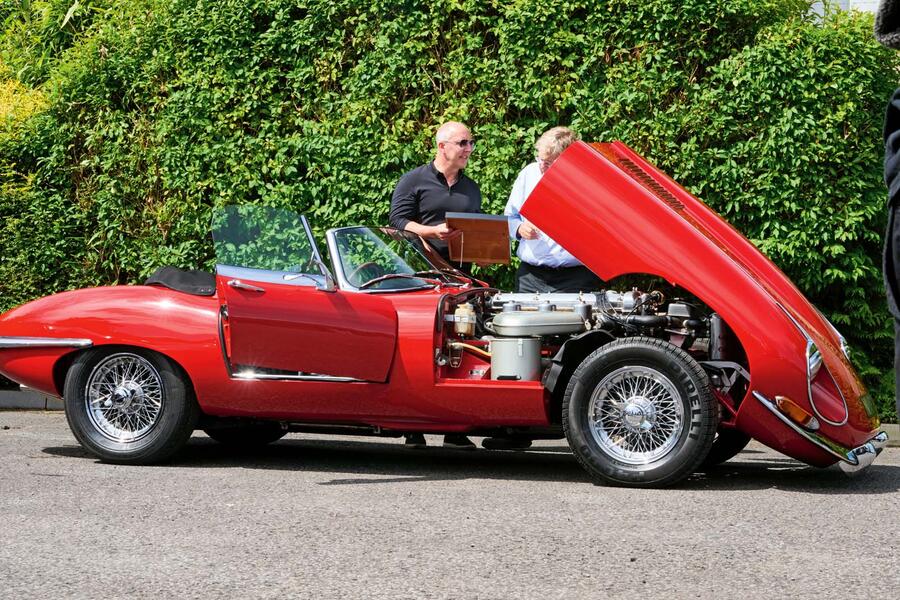
Robin Page
Design director Page’s beautiful red 1967 Series 1 1/2 roadster, which he has owned for about 13 years, is the opposite of a garage queen. He bought it during his first stint at Bentley, then took it to Gothenburg on the ferry when he was hired as Volvo’s design boss. Page drove it back again when he took up his current post nine months ago, reporting a high level of interest from Swedish car lovers because of its rarity. Over there, they’re more used to “big Yanks” as classics.
“It was this car’s form language that made me want to be a car designer,” says Page. “I love everything about it – the haunch, the long bonnet, the short boot. I was born in Coventry a couple of miles from Browns Lane, where this car was built, and its aura affected everything.”
Volkswagen Up GTI
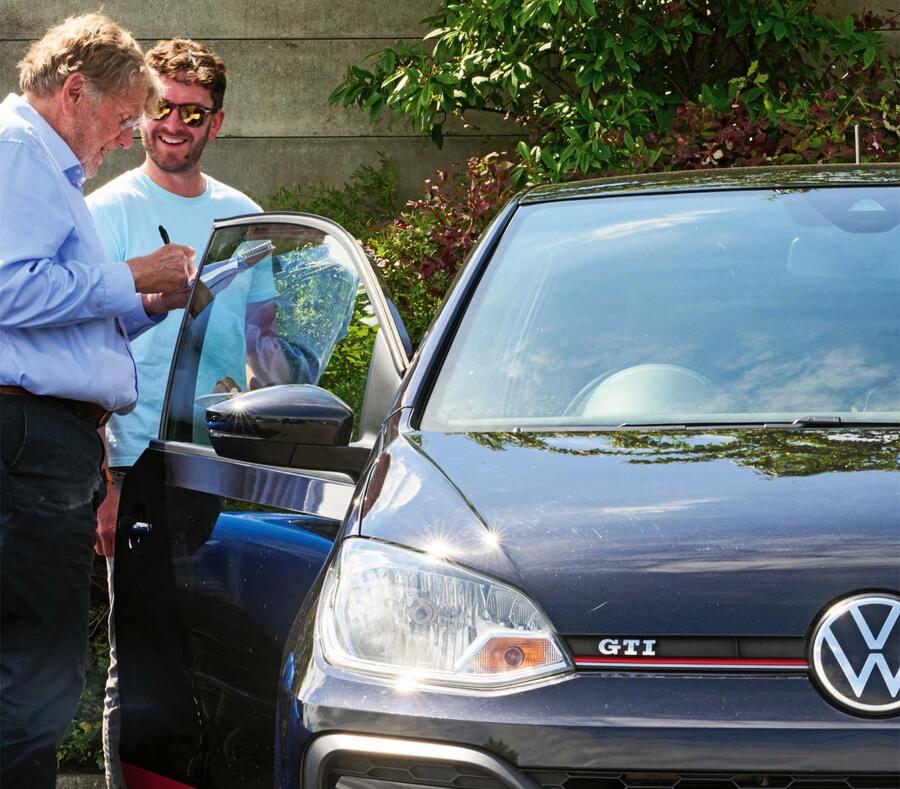
Jack Allenet
Allenet acquired his baby GTI three months ago to replace an MGB GT that was failing as a daily driver. A digital surfacing manager, he admires the Golf GTI family and especially likes the Up for its honesty and timelessness. And, of course, it drives brilliantly. He reckons it’s the recent VW model that stays closest to the values of the original Golf GTI in size, simplicity and edgy looks. He loves the tartan seats (a GTI tradition) but regrets the absence of a golf ball gearknob.
Northern Light e-trike
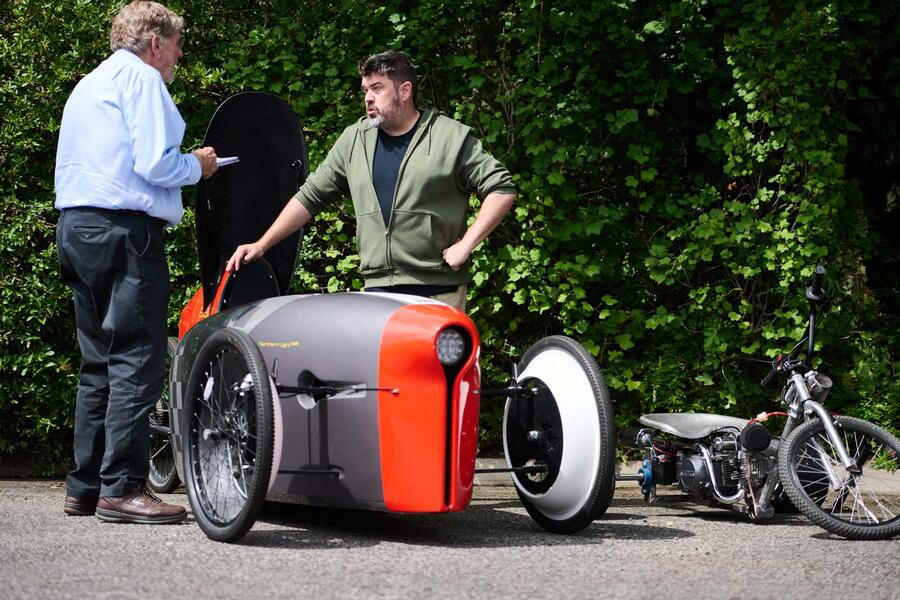
Graham Browne
Browne not only designed and built this novel e-trike but he also owns the company that can make one for you. His Northern Light Motors “ticks away in the background” while he does his day job. Formerly TVR’s chief designer, Browne has been building electrified single-seat trikes for the past few years, showing them at places like Bicester Heritage. The one he brought to Crewe was a slightly modified version of the £6500 630 model (named after the wavelength of the colour red). He also makes a 428 (blue) and a 557 (green).
The original idea of providing radically designed zero-emissions transport has been achieved: Browne now says he is following up a customer request for a version with roughly 600bhp per tonne on tap, plus a 120-mile range. He says it will be beefier in design and “quite a bit more expensive”.
Aston Martin V8 Vantage/Jaguar F-Type

Adrian Charnell/Alex Charnell
t’s not often you run into a father and son working in the same design studio, let alone one with a Jaguar F-Type and the other an Aston V8. Alex, the son, is a design validation engineer who always wanted an F-Type V6 and reckons his 20-plate late Series 1 P340 is the ideal, offering both a better shape and exhaust pops on the overrun unavailable on the later Series 2. The deep blue paint and black pack (“chrome dates F-Types”) are the icing on Alex’s cake.
Adrian, Alex’s dad, is also a studio engineer. He pushes back at a cack-handed comment I make about engineers and designers having different objectives. “Our job is to help designers achieve their objectives,” he says firmly, and when you see how well design meets engineering in the average Bentley, you get that. Adrian bought his 10-plate Aston after several Porsche Boxsters because, now semi-retired, he likes GT-style touring in Europe. So far, Adrian has done a trip to Tuscany and found the car “amazing”, though he also notes that it “feels raw” alongside Alex’s newer F-Type.
110cc homebuilt trike
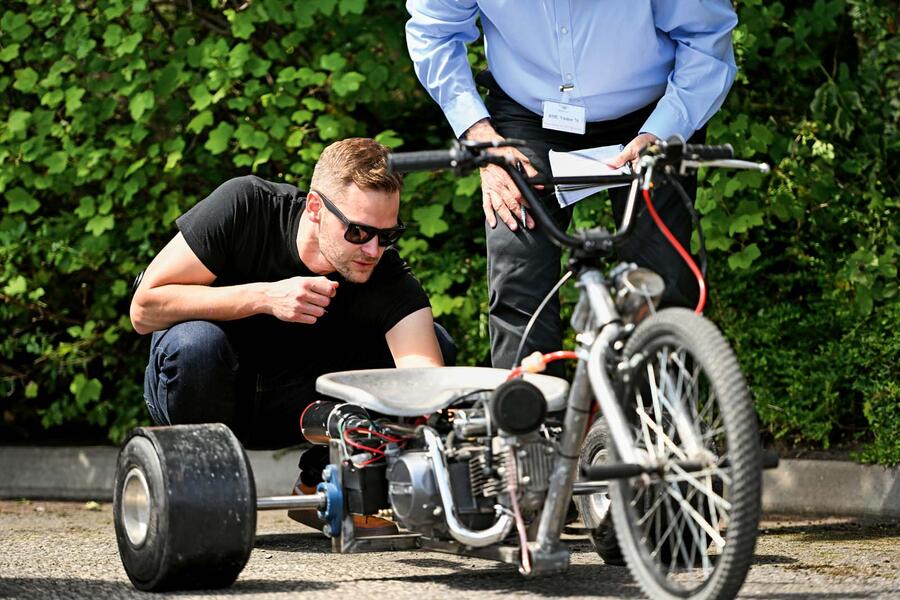
Tom Warwick
This tiny contraption looks perfect for pulling high-speed circuits of the design compound, in and out of the other cars, but that would be a bit antisocial, says its owner. A studio engineer, Warwick started the project by buying a Lifan 110cc single-cylinder motor in the pub, and the project grew in two years of spare moments. It’s loud and a bit wild, especially since it wears special rear PVC “overboots” that make it oversteer everywhere.
Caterham Seven
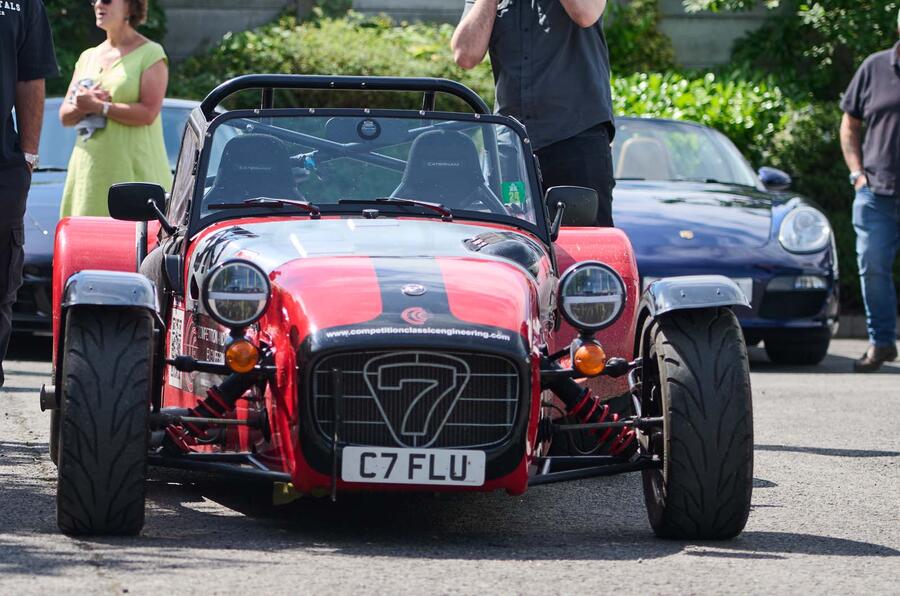
Chris Whitlow
There have been three Sevens in Whitlow’s motoring life; this latest has been in his garage for three years. It started life as a 1.6-litre 310R but has since been modified to produce 190bhp instead of the standard 150bhp, and though it is still a capable road car, it is also used for motorsport.
A digital modeller at Bentley, Whitlow uses the car a lot and recently took it on a 2500-mile trip to the Alps “without a grumble”. He has had Elans, 911s and a Porsche 928 but for sporting driving sees the Caterham as the cream of the crop.
Reliant Robin
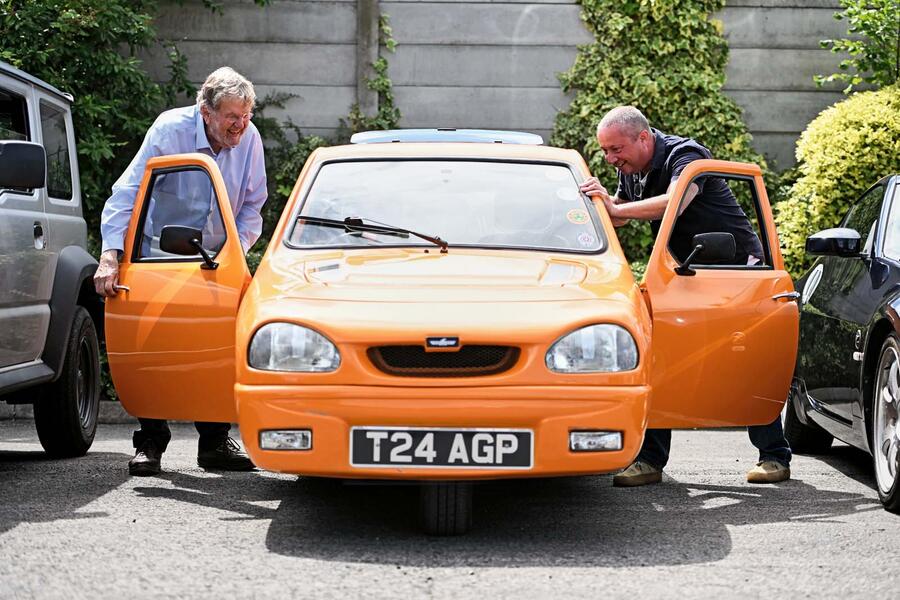
Andy Plumb
Well known in the design world for his varied career, Plumb was the last designer at now-defunct Reliant. He did the final styling refresh on the Robin, joined Morgan while the Super 3 was being created, and then joined Bentley. He is also famous for writing the latest Reliant three-wheeler book, entitled ironically Tipping Point.
Despite a keen knowledge of the Robin’s faults, Plumb uses one as a daily driver, having bought it on eBay in 2014 with 92,000 miles on the clock. He did a “nut and bolt” rebuild during lockdown and the car is now perfect. His other car is an Audi A2 and he has recently been eyeing up Citroën 2CVs.
Austin Allegro
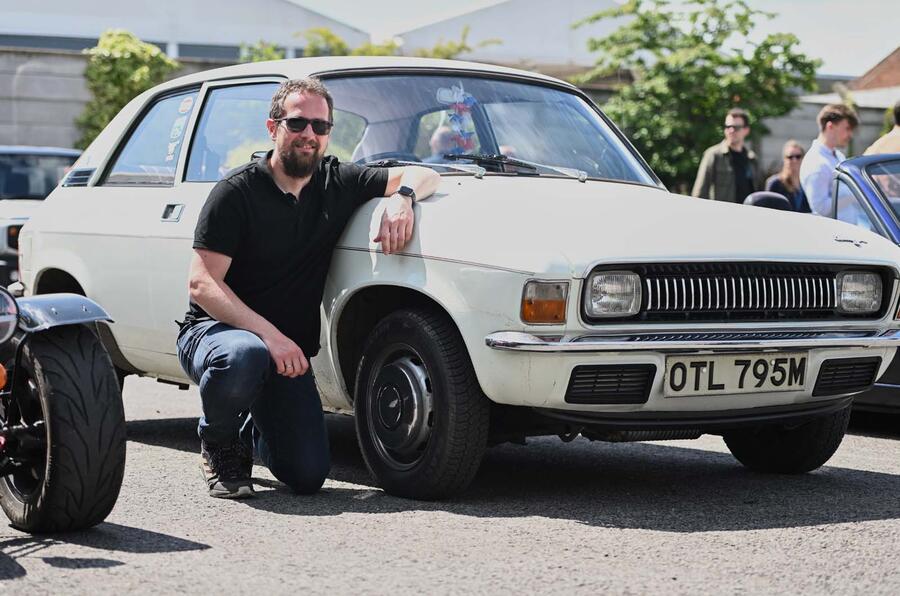
Fred Dams
This fine Allegro 1.1-litre has many special features: it is an early model with the legendary Quartic steering wheel, it is a rare three-door, it has been sympathetically restored – and it was owner Dams’s wedding car. An 18-year Bentley man who cites his first big achievement as designing the exterior changes for the Mk2 Continental GT, Dams says the car was actually bought by his wife in 2005, five years before he met her. It is used for occasional drives to work, cruising at a stately 45mph.
Dams is keen to point out that its clean, simple, 1970s lines are pretty and surprisingly modern; it was the car’s poor quality that built its bad reputation. “The Allegro is a very important member of our family,” he says. “We’ll never sell it.”
Porsche 944
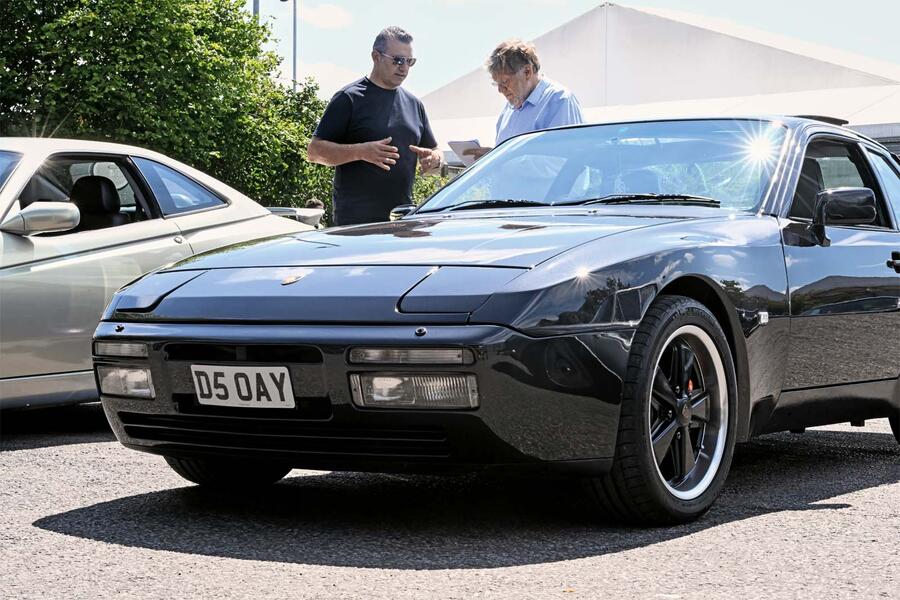
Darren Day
Bentley’s head of interior design is celebrating 30 years at Pyms Lane – and he has been regularly driving his 1991 Porsche 944 S2 to work there since he bought it in 2007. It’s a well used car, with one engine refresh in its 200,000 miles, but resplendent in Panthero Black it looks perfect.
Day loves the 944 for its rearward cab, interior design, driving position, unique plan view, wheel arches and ability to carry two kids and racing bike. In fact, he loves the car so much that when he decided during lockdown to get a local specialist to “give it some paint”, he extended the job to correcting some subtleties of its body shape. He taped it up like a studio model and had his panel man make small corrections to some lines and surfaces. The result is a beautiful, timeless car.
And finally…
My Bentley day ended far too soon. I’d like to have spent more time talking, among others, to Ben Gladas about his superb red Alfa Romeo Brera (an early import that once took me up the hill at Goodwood) and to Dave Gibson about his 143,000-mile Volvo 245, one of many family Volvos.
However, I did end my time behind Bentley’s steel gates with a viewing of the latest star of the firm’s 30-strong classic collection, an immaculate 1965 T1 sa loon brought along by Bentley ’s communications director and collection custodian, Wayne Bruce. Found in Florida a decade ago, the car recently returned from a three-year refurb at famous, Essex-based P&A Wood. It turns out that this machine, whose siblings shared their bodies with the Rolls-Royce Silver Shadow from 1965, was the very first of either marque to roll off the Crewe production line. It was pure treasure – and a perfect way to end two hours of delight.
Source: Autocar
